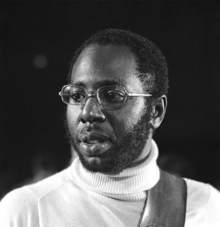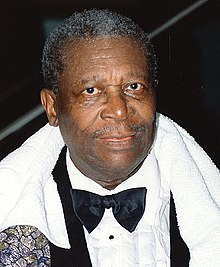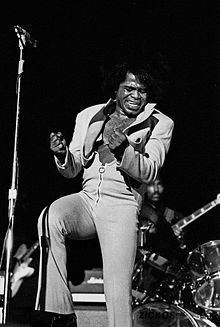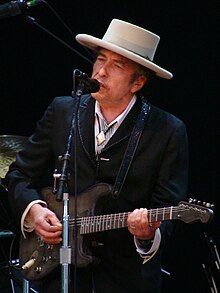EFL Interdisciplinary Projects/Reading and Writing/Nina cried power
Cooperative writing about the song Nina cried power of the singer Hozier
Nina cried power
[edit | edit source]This song mentions some important names in the fight for equality. The students are going to put together their understanding about those names.
- Who are those people?
- What was their contribution?
- What do their songs tell you?

Singing for change
[edit | edit source]Nina Simone is a black pianist, songwriter, arranger, civil right activist
By the early 1960s, Simone became active in the Civil Rights Movement, taking part in the Selma to Montgomery marches and recording several songs that soon became civil rights anthems. Her original song, “Mississippi Goddam,” was banned from radio play throughout the South for its frank discussion of racism.[1] She suffered in the ways of racial injustice as a child. She also suffered from domestic abuse, mental illness, dissatisfaction, regret, and knew how it felt to have dirt kicked up on her when she was already down. She wrote of the seething anger from being overworked, and under-appreciated. She knew the burning pain of love lost, and the clenching fear of having that true love leave you. I related to Nina, who was a very accomplished person in piano or academic skills but she longed for her own dream. She was a natural crusader.[2]

Billie Holiday was an American jazz and swing music singer. Her real name is Eleanora Fagan.
Video - After enduring a difficult childhood, Billie Holiday got her big break after being discovered in a jazz club by John Hammond for her skill at improvising when she sang.
Billie Holiday is considered one of the best jazz vocalists of all time, Holiday had a thriving career as a jazz singer for many years before she lost her battle with substance abuse. Also known as Lady Day, her autobiography was made into the 1972 film Lady Sings the Blues. In 2000, Holiday was inducted into the Rock and Roll Hall of Fame.[3]
Billie Holiday, the legendary jazz singer, challenges the injustice of lynching with her iconic rendition of the song “Strange Fruit,” the first great Civil Rights Movement protest song, but she paid a high price.
Billie Holiday had a tough childhood. At 9 years old she started working as an errand-runner in a Baltimore brothel and was sexually assaulted. At the age of 10, she was sent to The House of the Good Shepherd, a Catholic reform school for “troubled” African-American girls.[4]

Lee Mayfield was born on June 3, 1942. Curtis was an American singer-songwriter, guitarist, and record producer. He's an African-American music, and he died on December 26, 1999.
"Curtis Mayfield was a prophet, a preacher, a revolutionary, a humanist, and a griot (West African historian, storyteller, praise singer, poet and musician ). He took the music to its most essential level in the America of his day. If you had ears to hear, you knew that Curtis was a man with a positive message – a message that was going to help you to survive. He was in the foreground, always in the breach, both soft and powerful at the same time. For these reasons, his music still resounds in my heart".[5]

Mavis Staples an American rhythm & blues and gospel singer, actress, and civil rights activist.
Staples has been using her voice to drown out hate since her first public performances with her family band, the Staple Singers, in the early ‘50s. Under the direction of her father, Roebuck “Pops” Staples, she, along with her brother Pervis and her sisters Yvonne and Cleotha, responded to the injustices wreaked by segregation in the Jim Crow South through song. Their music struck a chord with Martin Luther King, Jr, especially the bluesy, bewildered “Why? (Am I Treated So Bad),” which Pops wrote after a group of black students who would come to be known as the Little Rock Nine attempted to integrate a high school in 1957. King brought out the Staple Singers to perform before several of his speaking engagements. They continued to infuse their music with protest and politics as their activism and popularity -- which peaked in the ‘70s with the Billboard Hot 100 No. 1 hits “I’ll Take You There” and “Let’s Do It Again” -- grew throughout the Civil Rights Movement.[6]

Patti LaBelle an African American singer, songwriter, actress, hostess and businessperson.
In addition to her amazing entertainment career, Ms. LaBelle's work as a humanitarian is just as legendary. She remains an advocate for adoption, foster care, Big Sisters and the United Negro College Fund, among many other initiatives. While Ms. LaBelle's celebrated career is respected world-wide, she has also endured and survived personal strife. Within a 10-year period, she lost her mother, three sisters and best friend to diabetes and cancer. In 1994, LaBelle was diagnosed with diabetes and shortly thereafter became a spokesperson for the American Diabetes Association.[7]

John Lennon was an actor and peace activist with hippie ideals. He also was the founder, co-lead singer, songwriter, rythm guitarist of the beatles, and that was how he gained his worldwide fame.

B.B King was singer-songwriter, guitarist and record producer. Bisides that he was a revolutionary man in the world of the blues, because King introduced a sophisticated style of soloing based on fluid string bending and shimmering vibrato that influenced many later blues electric guitar players[8]

James Joseph Brown Jr was born on May 3, 1933. He was an American singer, songwriter, dancer, musician, record producer and bandleader. He died on December 25, 2006. He was a progenitor of funk music.

Peter Seeger was born on May 3, 1919. He was an American folk singer and social activist. He served in the US Army during the WWII. He died on January 27, 2014, at the age of 94.
He used his music to support a litany of political causes and movements, becoming known as a thoughtful and thought-provoking writer and performer of left-wing political anthems. Whether as a solo performer or as part of the groups The Weavers and The Almanac Singers, Seeger’s songs influenced several social movements of the 20th century, with many of his most famous songs centering on themes of war, labor rights and civil rights.[9]

Bob Dylan, whose real name is Robert Allen Zimmerman, was born on May 24, 1941. He is an American singer-songwriter, author, and visual artist. His musical career comprises folk, blues, gospel, rock, country, tradicional pop, and vocal jazz. Bob is author of popular songs such as "Blowin' in the Wind" (1963) and "The Times They Are a-Changin'" (1964).

Marvin Pents Gay Jr was born on April 2, 1939. He was an American singer, songwriter, and record producer, know as Marvin Gaye. He died on April 1, 1984, at the age of 44.

Millie Jackson or Mildred Virginia Jackson is an American R&B and soul singer-songwriter and former model. She is born on July 15, 1944 in Thomson, Georgia. She refers to herself as other have toted as the "mother of hip-hop".

Woody Guthrie was a singer-songwriter of century XX. He was the most representative figure in American western folk music. His most known song is "This land is your Land". He has inspired several generations both politically and musically.
External reading
[edit | edit source]Hozier Unpacks His New 'Nina Cried Power' EP: 'It's a Thank You Note to the Spirit of Protest'
Why Hozier’s Protest Song “Nina Cried Power” Matters
Hozier - Nina Cried Power ft. Mavis Staples - YouTube
References
[edit | edit source]- ↑ "Nina Simone: Musician and Civil Rights Activist". Boulder Swing Dance. Retrieved 2020-08-13.
- ↑ "Who Is Sister Sadie?". Viva. Retrieved 2020-08-25.
- ↑ "Billie Holiday". Biography. Retrieved 2020-08-25.
- ↑ "Billie Holiday's "Strange Fruit": The First Great Protest Song of the Civil Rights Movement". Inside Out Tours. Retrieved 2020-08-25.
- ↑ "Curtis Lee Mayfield". Jazz at the Library - Anacortes Public Library. 2014-12-10. Retrieved 2020-08-27.
- ↑ "Mavis Staples Has Plenty to Say About Her '60s Spirit of Protest: 'I'm Still Singing My Freedom'". Billboard. 2019-02-13. Retrieved 2020-08-18.
- ↑ "Patti Labelle". We Are Family Foundation. Retrieved 2020-08-12.
- ↑ "B.B. King". Wikipedia. 2020-08-12. https://en.wikipedia.org/w/index.php?title=B.B._King&oldid=972441313.
- ↑ "Songs of Peace and Protest: 6 Essential Cuts From Pete Seeger". Time. Retrieved 2020-08-18.
